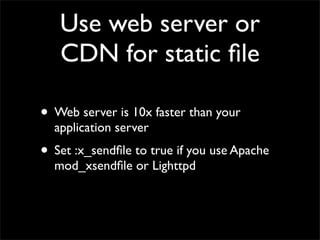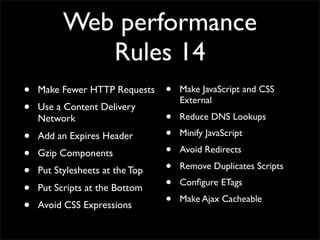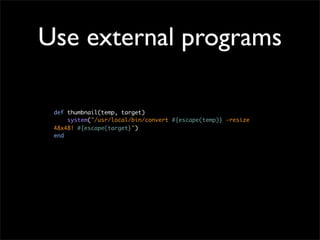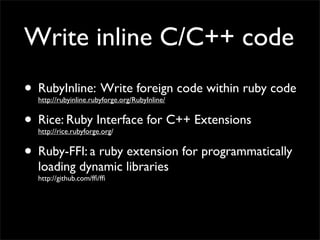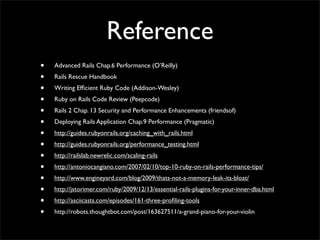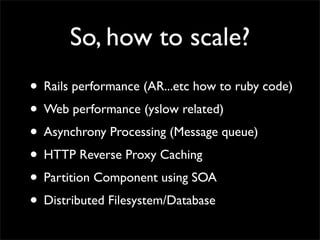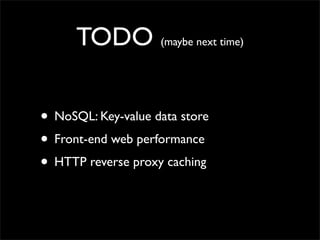The document provides performance best practices for Ruby on Rails applications. It discusses avoiding premature optimization, measuring performance bottlenecks, caching, SQL optimizations, and alternative storage options like NoSQL. It also recommends profiling tools like New Relic, Scout, Rack::Bug and ruby-prof to analyze logs and identify slow requests and actions. Benchmarking and integrating performance tests are also suggested for measuring and testing performance.
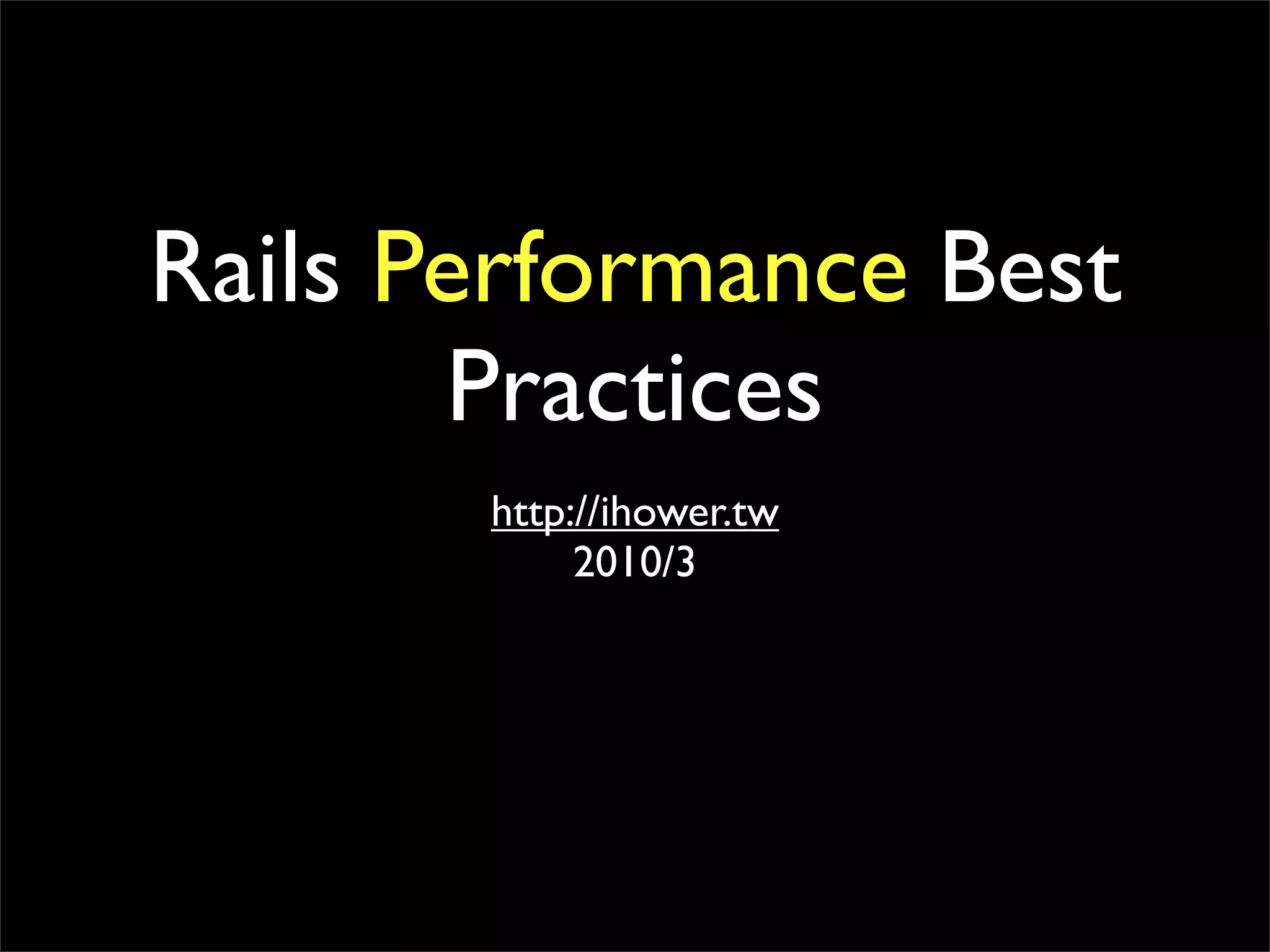

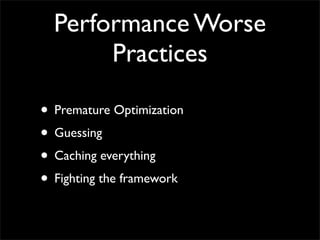
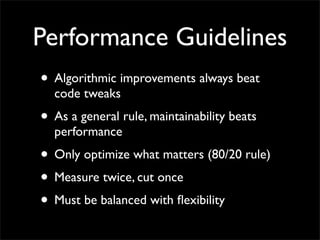
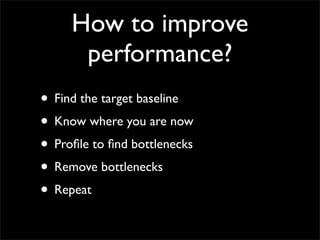
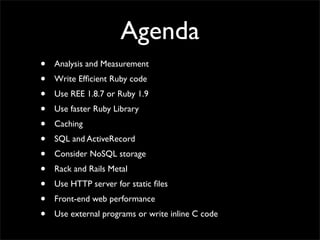

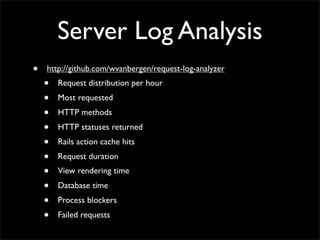

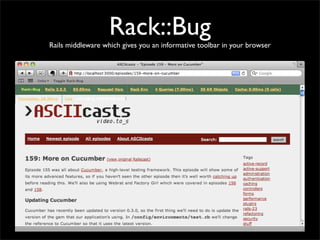
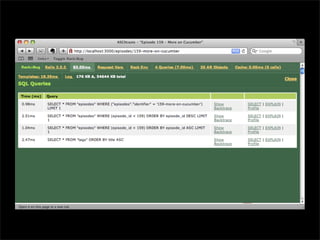
![MemoryLogic
Adds in proccess id and memory usage in your rails logs, great for tracking down
memory leaks
• http://github.com/binarylogic/memorylogic
Processing WelcomeController#index (for 127.0.0.1 at 2010-02-26 01:51:54) [GET] (mem 104792)
Parameters: {"action"=>"index", "controller"=>"welcome"} (mem 104792)
...
Memory usage: 108888 | PID: 6170 (mem 108888)
Completed in 3570ms (View: 1861, DB: 1659) | 200 OK [http://localhost/] (mem 108888)](https://image.slidesharecdn.com/rails-performance-2010226-100228083842-phpapp01/85/Rails-Performance-12-320.jpg)


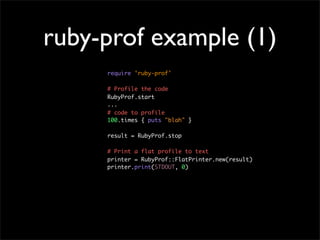
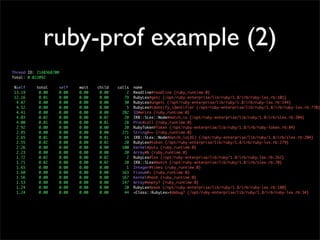
![Rails command line
# USAGE
script/performance/profiler 'Person.expensive_method(10)' [times] [flat|graph|graph_html]
# EXAMPLE
script/performance/profiler 'Item.all'](https://image.slidesharecdn.com/rails-performance-2010226-100228083842-phpapp01/85/Rails-Performance-17-320.jpg)

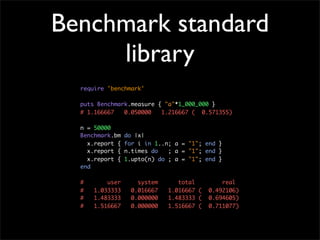
![Rails command line
# USAGE
script/performance/benchmarker [times] 'Person.expensive_way' 'Person.another_expensive_way' ...
# EXAMPLE
script/performance/benchmarker 10 'Item.all' 'CouchItem.all'](https://image.slidesharecdn.com/rails-performance-2010226-100228083842-phpapp01/85/Rails-Performance-20-320.jpg)
![Rails helper methods
Creating report in your log file
# Model
Project.benchmark("Creating project") do
project = Project.create("name" => "stuff")
project.create_manager("name" => "David")
project.milestones << Milestone.find(:all)
end
# Controller
def process_projects
self.class.benchmark("Processing projects") do
Project.process(params[:project_ids])
Project.update_cached_projects
end
end
# View
<% benchmark("Showing projects partial") do %>
<%= render :partial => @projects %>
<% end %>](https://image.slidesharecdn.com/rails-performance-2010226-100228083842-phpapp01/85/Rails-Performance-21-320.jpg)
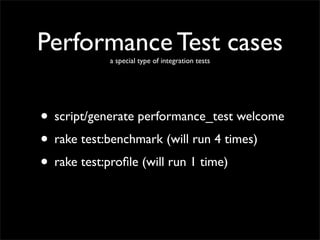
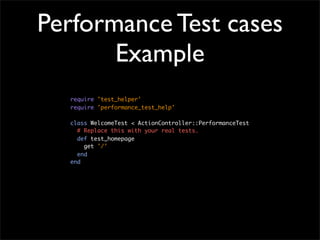
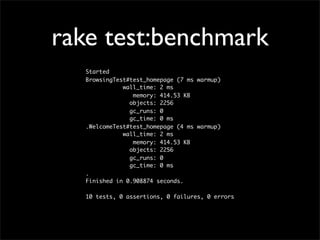
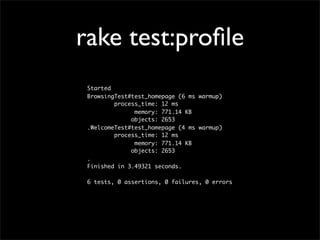
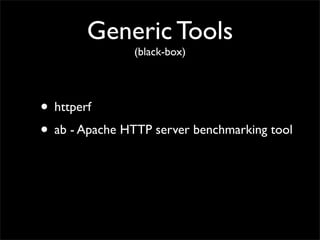
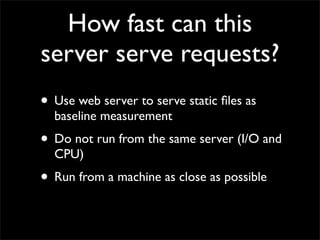

![httperf example
httperf --server localhost --port 3000 --uri / --num-conns 10000
httperf --client=0/1 --server=localhost --port=3000 --uri=/ --send-buffer=4096 --recv-buffer=16384 --num-conns=10000 --
num-calls=1
httperf: warning: open file limit > FD_SETSIZE; limiting max. # of open files to FD_SETSIZE
Maximum connect burst length: 1
Total: connections 10000 requests 10000 replies 10000 test-duration 18.373 s
Connection rate: 544.3 conn/s (1.8 ms/conn, <=1 concurrent connections)
Connection time [ms]: min 0.1 avg 1.8 max 4981.7 median 0.5 stddev 50.8
Connection time [ms]: connect 0.7
Connection length [replies/conn]: 1.000
Request rate: 544.3 req/s (1.8 ms/req)
Request size [B]: 87.0
Reply rate [replies/s]: min 55.0 avg 558.3 max 830.7 stddev 436.4 (3 samples) 1 sample need 5s
Reply time [ms]: response 0.7 transfer 0.4 30 samples will be accurate
Reply size [B]: header 167.0 content 3114.0 footer 0.0 (total 3281.0)
Reply status: 1xx=0 2xx=10000 3xx=0 4xx=0 5xx=0
CPU time [s]: user 3.24 system 14.09 (user 17.7% system 76.7% total 94.4%)
Net I/O: 1790.1 KB/s (14.7*10^6 bps)
Errors: total 0 client-timo 0 socket-timo 0 connrefused 0 connreset 0](https://image.slidesharecdn.com/rails-performance-2010226-100228083842-phpapp01/85/Rails-Performance-29-320.jpg)
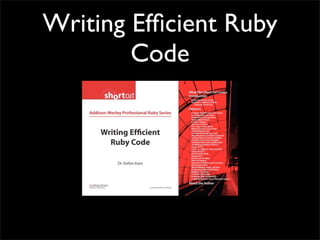
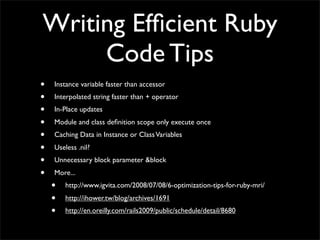

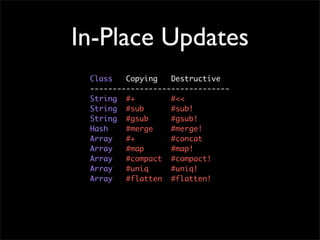
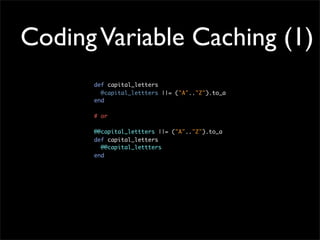
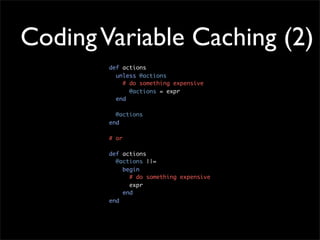
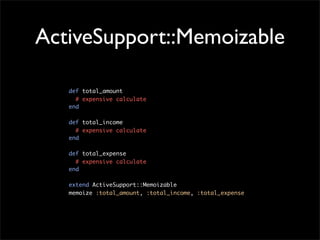
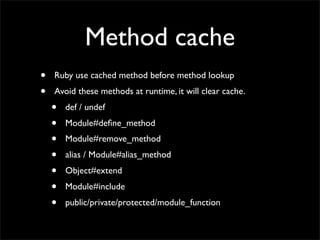
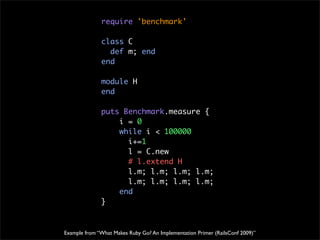
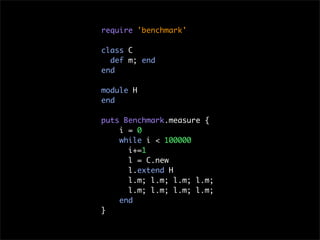
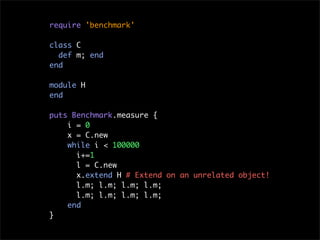
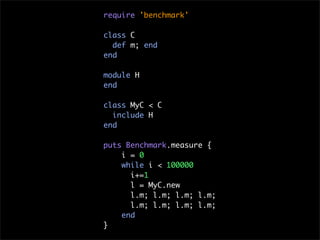

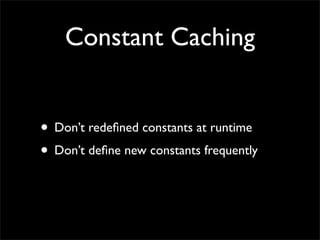
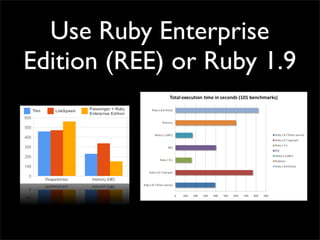
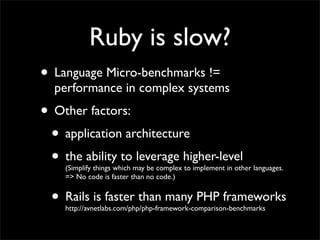
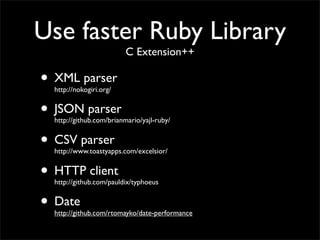

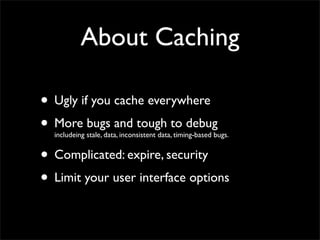
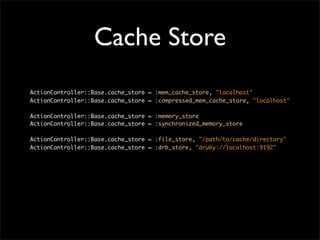

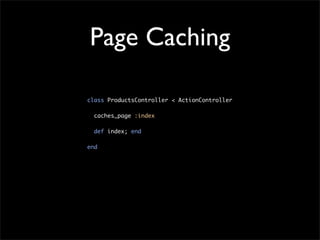
![Action Caching
class ProductsController < ActionController
before_filter :authenticate, :only => [ :edit, :create ]
caches_action :edit
def index; end
def create
expire_page :action => :index
expire_action :action => :edit
end
def edit; end
end](https://image.slidesharecdn.com/rails-performance-2010226-100228083842-phpapp01/85/Rails-Performance-52-320.jpg)
![Fragment Caching
<% cache(:key =>
['all_available_products', @latest_product.created_at].join(':')) do %>
All available products:
<% end %>
expire_fragment(:key =>
['all_available_products', @latest_product.created_at].join(':'))](https://image.slidesharecdn.com/rails-performance-2010226-100228083842-phpapp01/85/Rails-Performance-53-320.jpg)
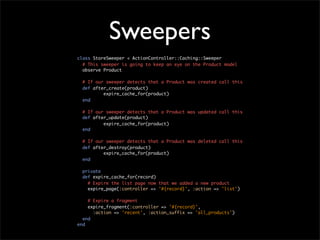
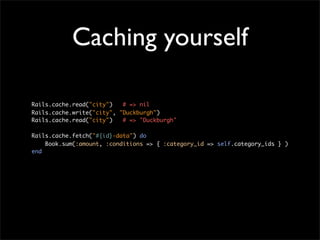
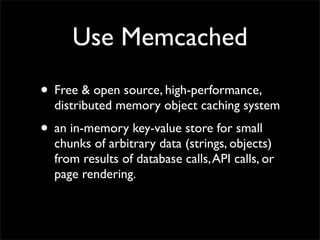
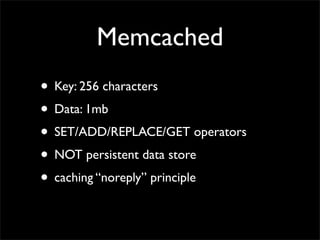

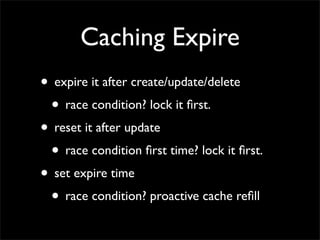
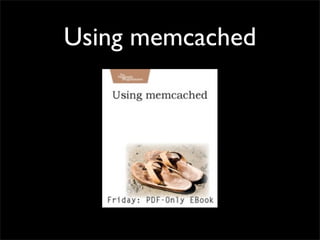


![N+1 Queries
# model
class User < ActieRecord::Base
has_one :car
end
class Car < ActiveRecord::Base
belongs_to :user
end
# your controller
def index
@users = User.paginate( :page => params[:page], :per_page => 20 )
end
# view
<% @users.each do |user| %>
<%= user.car.name %>
<% end %>](https://image.slidesharecdn.com/rails-performance-2010226-100228083842-phpapp01/85/Rails-Performance-63-320.jpg)
![Add :include
# your controller
def index
@users = User.paginate( :include => :car, :page => params
[:page], :per_page => 20 )
end](https://image.slidesharecdn.com/rails-performance-2010226-100228083842-phpapp01/85/Rails-Performance-64-320.jpg)

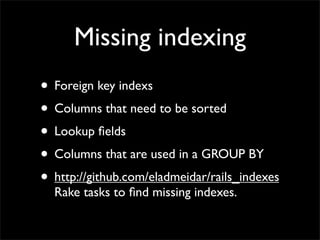

![Replace :include to :join
for some case
Group.find(:all, :include => [ :group_memberships ], :conditions =>
[ "group_memberships.created_at > ?", Time.now - 30.days ] )
# you can replace :include to :join
Group.find(:all, :joins => [ :group_memberships ], :conditions =>
[ "group_memberships.created_at > ?", Time.now - 30.days ] )](https://image.slidesharecdn.com/rails-performance-2010226-100228083842-phpapp01/85/Rails-Performance-68-320.jpg)
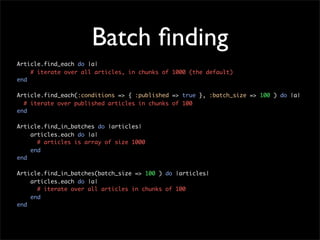
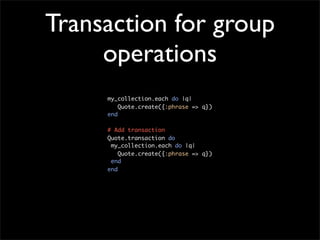
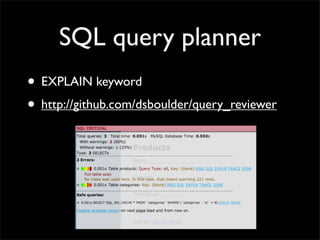
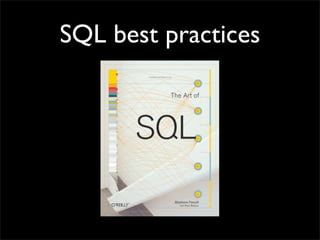
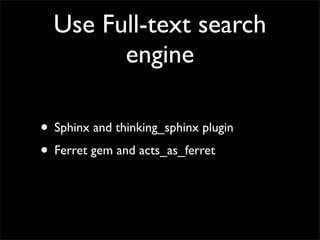
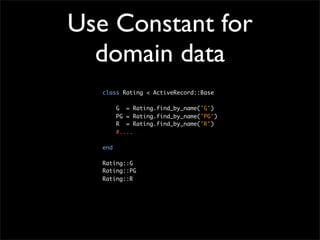
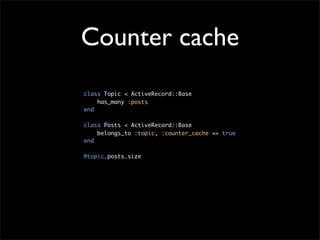


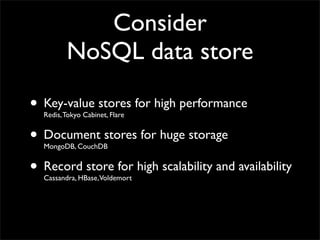




• #[]=(key, value)
• #delete(key)
• #key?(key)
• #store(key, value, options)
• #update_key(key, options):
• #clear](https://image.slidesharecdn.com/rails-performance-2010226-100228083842-phpapp01/85/Rails-Performance-82-320.jpg)
![example
begin
# for developer has tokyo cabinet
STORE = Moneta::Tyrant.new( :host => 'localhost', :port => 1978 )
rescue
# for developer has not tokyo cabinet
STORE = Moneta::BasicFile.new( :path => "tmp" )
end
STORE["mykey"] = { :foo => 111 , :bar => 222 }](https://image.slidesharecdn.com/rails-performance-2010226-100228083842-phpapp01/85/Rails-Performance-83-320.jpg)

